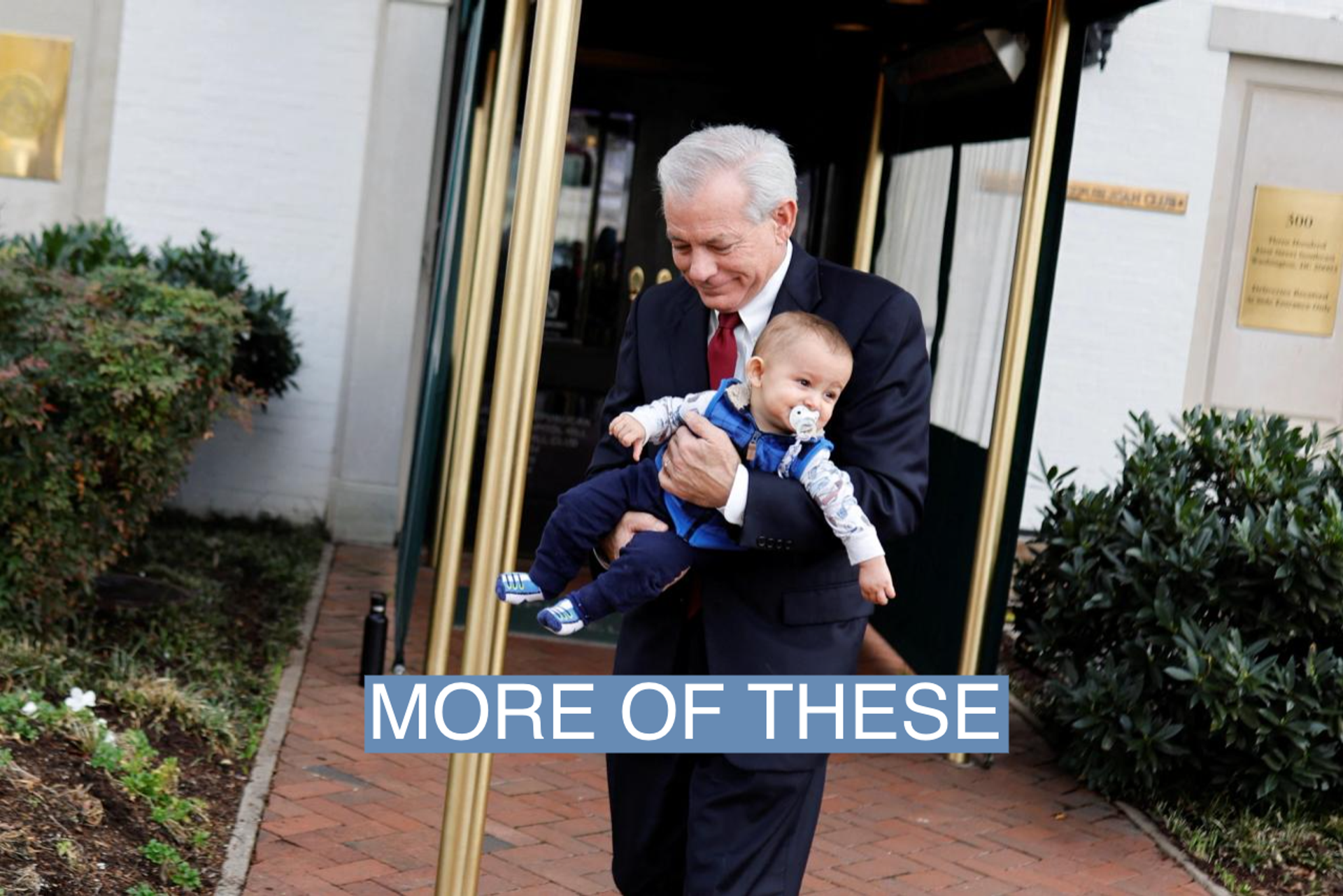The News
Between his riffs on preventing World War III and delivering retribution against his enemies, Donald Trump rolled out a relatively new plan at CPAC on Saturday: More babies.
“We will support baby bonuses for a new baby boom!” Trump said to a cheering crowd of conservatives. “I want a baby boom! You men are so lucky out there — you are so lucky, men.”
The very same week, freshman Senator J.D. Vance, R-Ohio said he’s eyeing legislation to provide universal pregnancy coverage in the coming months. He argued on Monday that “it’s way too expensive” to give birth in the US. In other words, it might be a step towards single-payer for babies.
“I think that if you actually want a society where families can bring new life into the world — and I certainly do — then that’s a problem to fix,” he told Semafor. “It’s really not more complicated than that.”
These are the latest signs that a turn toward natalism — policies explicitly designed to encourage more births — is breaking through on the right after years of lobbying by a small group of socially conservative policy wonks.
“This is a conversation that in some respects has been going on for a long time, and we’ve been sort of beating the drum in the wilderness,” Patrick Brown, a family policy expert at the conservative Ethics and Public Policy Center who has briefed Republicans in Congress, told Semafor. “If there’s ways that policy can get involved to lift some of the burdens off parents or would-be parents, I think Republicans are now much more sensitive to that concern than they certainly would have been 10 years ago.”
In this article:
Joseph’s view
On paper, there should be lots of room for Democrats and Republicans to work together on this issue. Members of both parties have proposed significant benefits targeted at families with young children. It wouldn’t be the first time, either: the child tax credit was originally the product of a coalition between anti-poverty progressives and tax-cutting conservatives in the late 1990s.
While they rarely tie their policies directly to falling birth rates, Democrats have rolled out a number of ideas to make it easier to have and raise children. President Biden tried to make a massive expansion of child tax credits his political legacy before crashing into Sen. Joe Manchin, D-W. Va, who proved to be immovable in his resistance. The failed Build Back Better talks also included a push for universal pre-K and child care programs that politicians like Sen. Elizabeth Warren, D-Mass. had championed in their campaigns. Paid parental leave is a virtually universal Democratic goal.
Some family benefit proposals normally considered beyond the boundaries of the political right are starting to find proponents among conservatives. They have sometimes clashed on the details, though: Mitt Romney revised an earlier proposal to provide up to $350 in monthly checks to parents last year to cut off parents making less than $10,000 in order to address critics on the right who complained it would discourage work.
The trend might have been accelerated in part by last year’s Dobbs decision, which put Republicans on the defensive over their support for mothers as they tried to force women to carry unwanted pregnancies to term. Sen. Marco Rubio, R-Fla. recently packaged some of his proposals for expanded child tax credits and parental leave into ”a pro-life plan for post-Roe America.”
“Trump, JD Vance, Romney, Rubio — diverse parts of the party are coming up with ideas to help support families, and that’s huge,” Abby McCloskey, a conservative policy expert who has consulted with potential 2024 Republican presidential candidates, told Semafor.
Still, many of these proposals have limited backing among GOP lawmakers and their stiff price tag puts them in competition with Republican-backed tax cuts elsewhere. “The view within the GOP that the federal government should be subsidizing marriage and more children will remain a minority,” Scott Winship, director of the Center on Opportunity and Social Mobility at the right-leaning American Enterprise Institute, predicted to Semafor.
Room for Disagreement
On the left, Jill Filipovic argues that policies to better support families are a good idea on the merits, but that linking them to calls for higher birth rates to win conservative support is a mistake. Similar “baby bucks” policies in countries like Hungary are often intertwined with anti-immigration politics and they’ve so far mostly failed to actually convince parents to have more children. “Natalism comes with a whole lot of baggage, limited benefits, and potentially significant costs,” she writes.
Notable
- Conservative New York Times columnist Ross Douthat has made falling birth rates a regular focus of his work over the last decade, tying the lack of children to social decay and economic malaise and urging conservatives to abandon free market doctrine to tackle it.
- On the center-left side of the equation, writer Matthew Yglesias published a book advocating for “One Billion Americans” through a combination of increased immigration and pro-family policymaking. He framed the debate in geopolitical terms, arguing that rapid population growth would not only yield benefits at home, but help counter a rising China.
